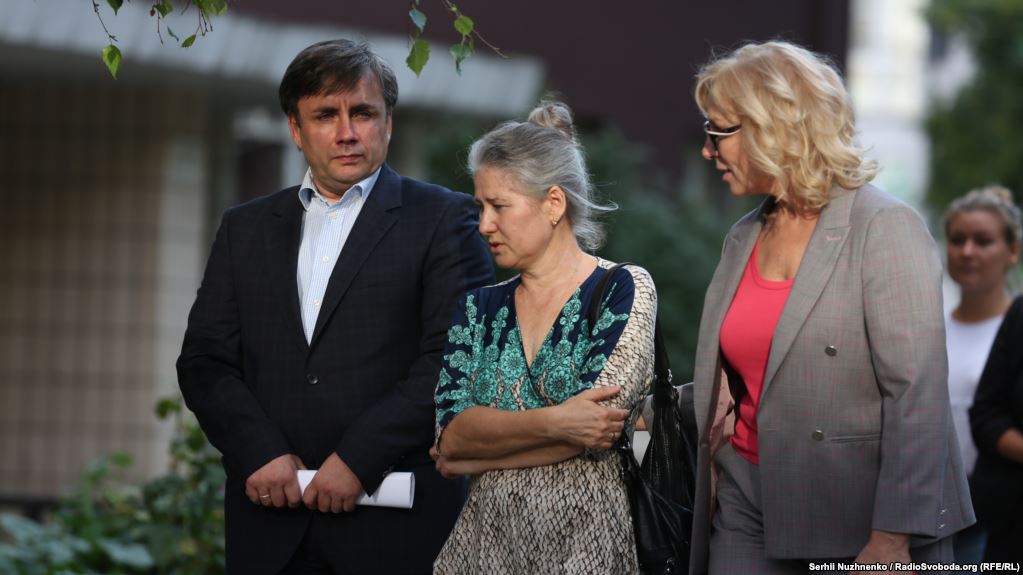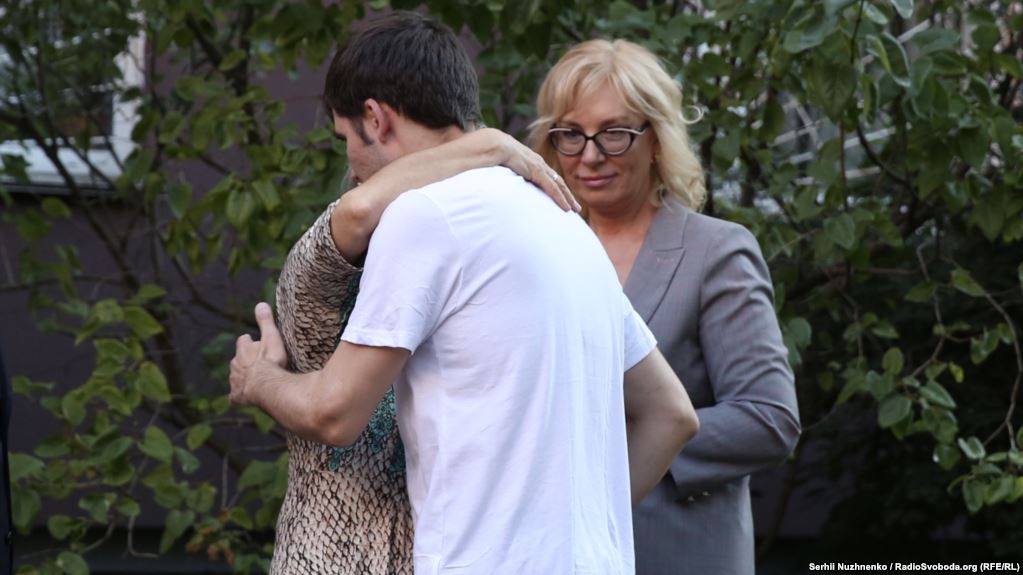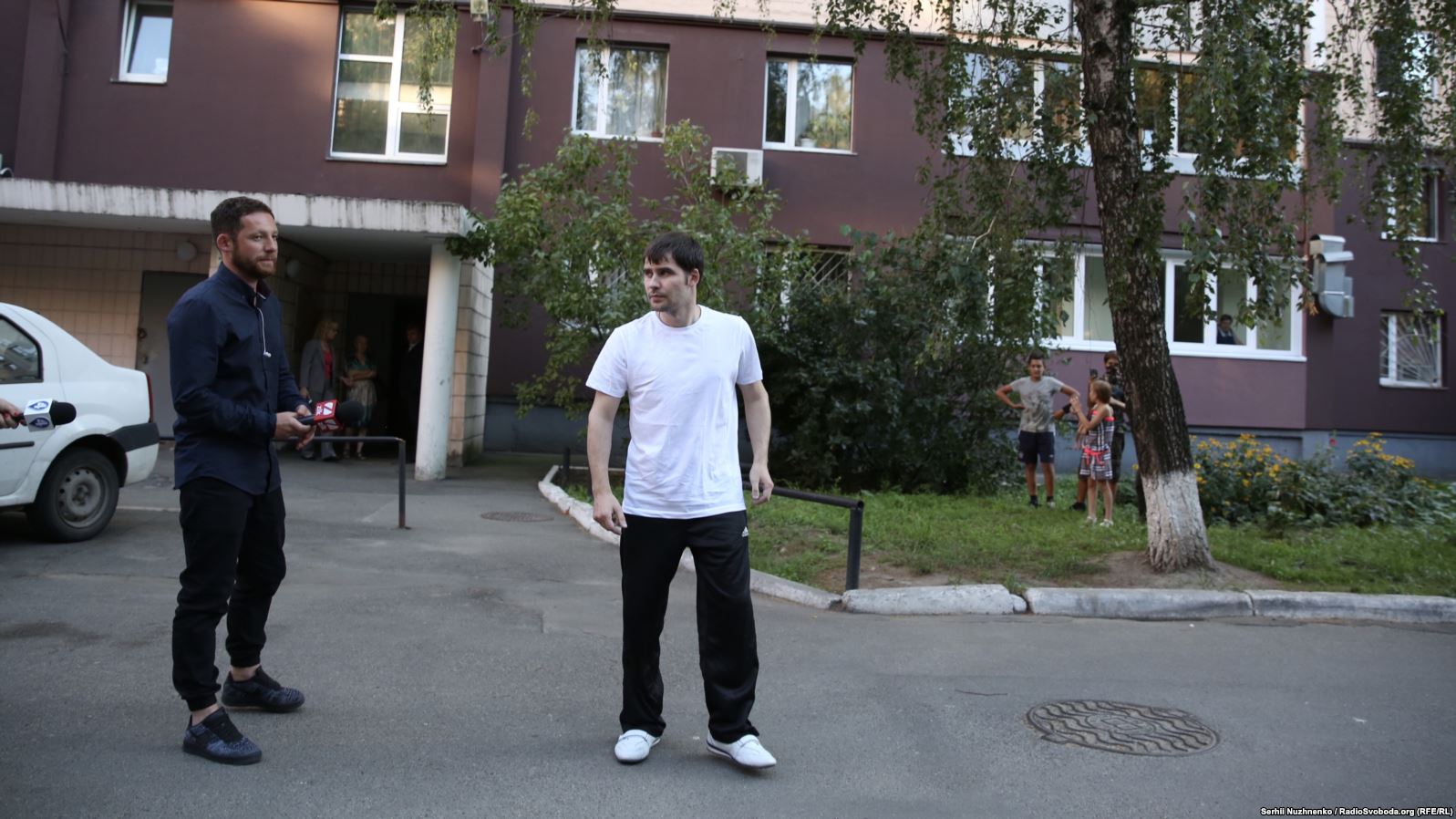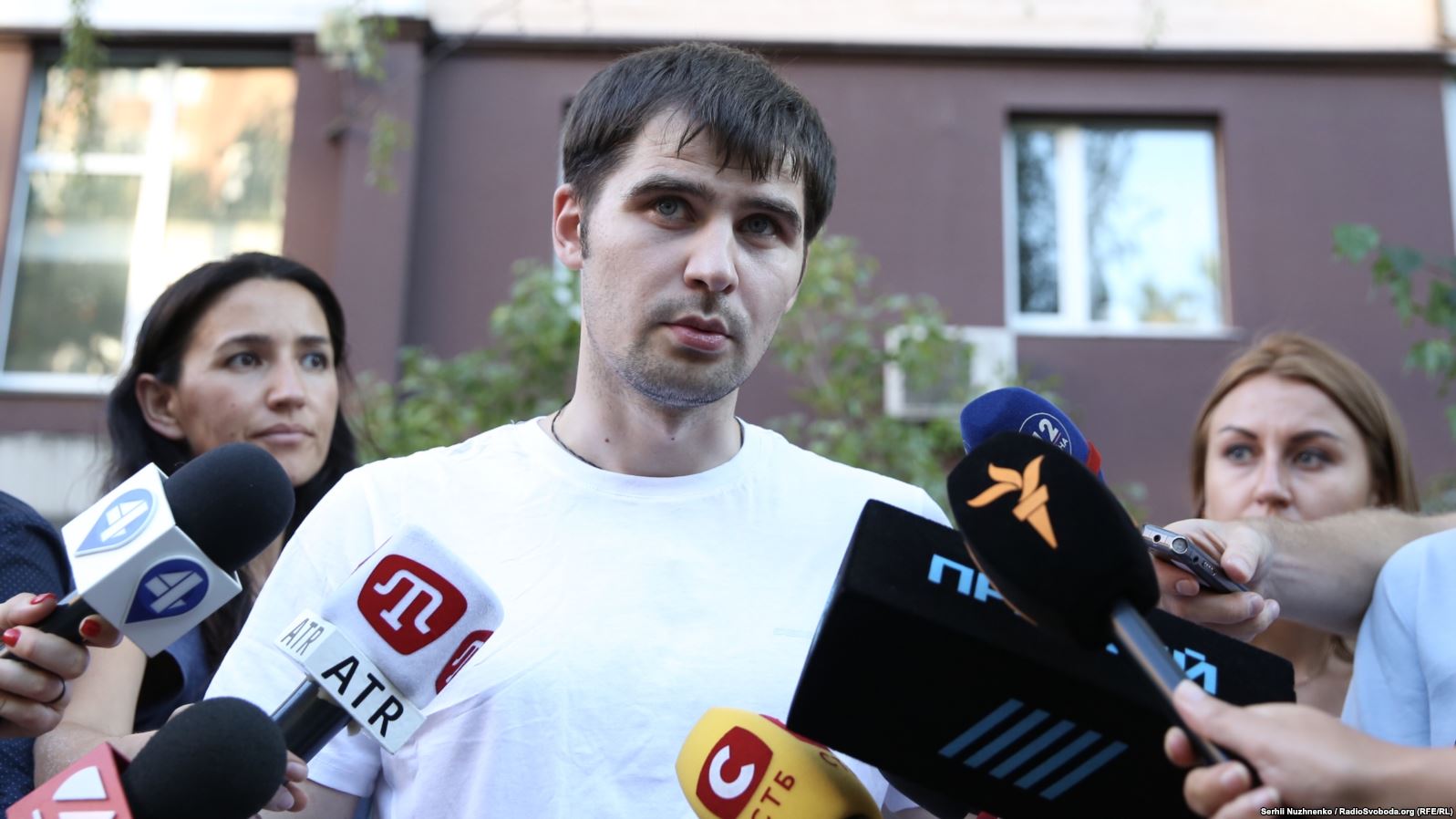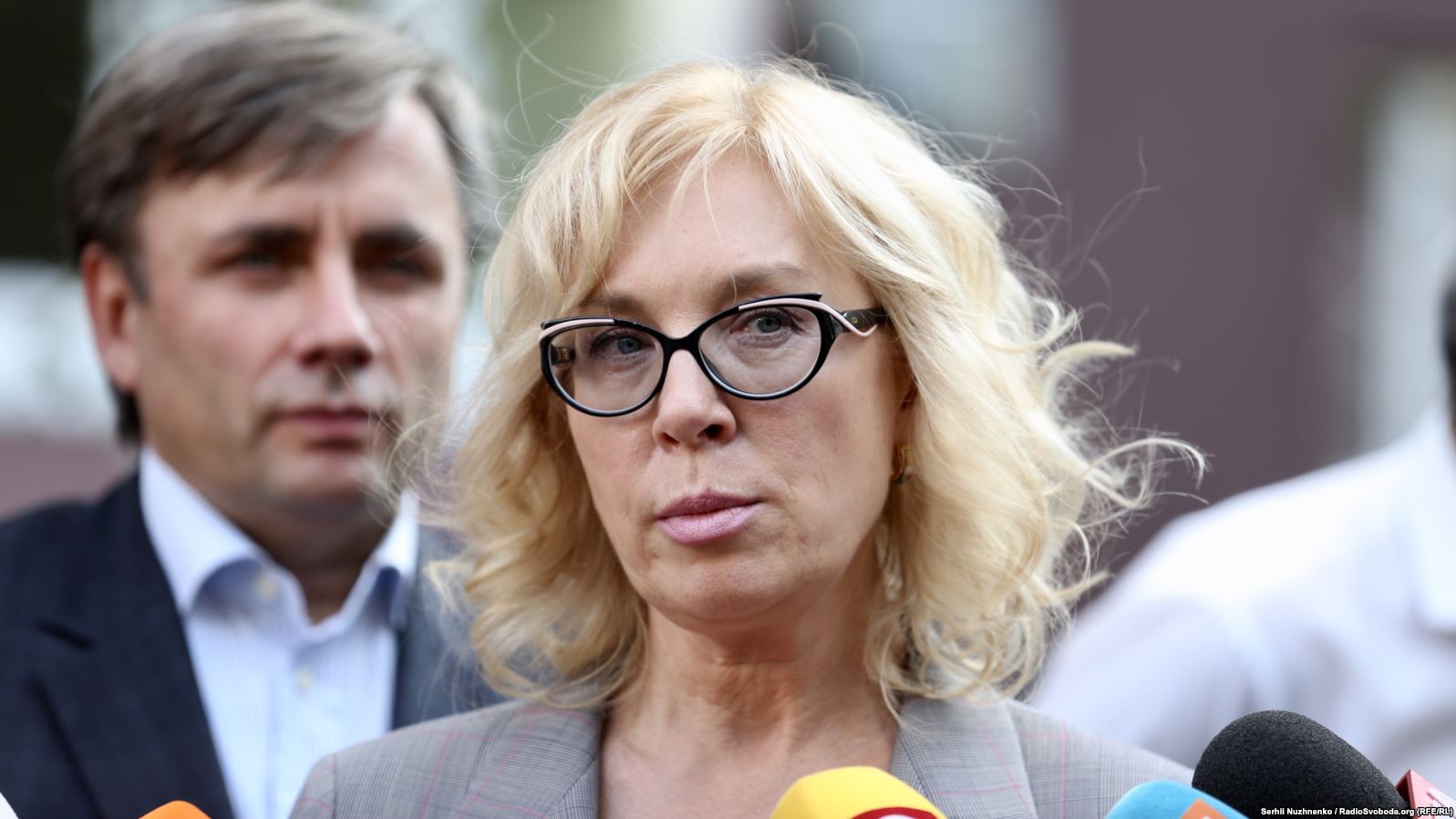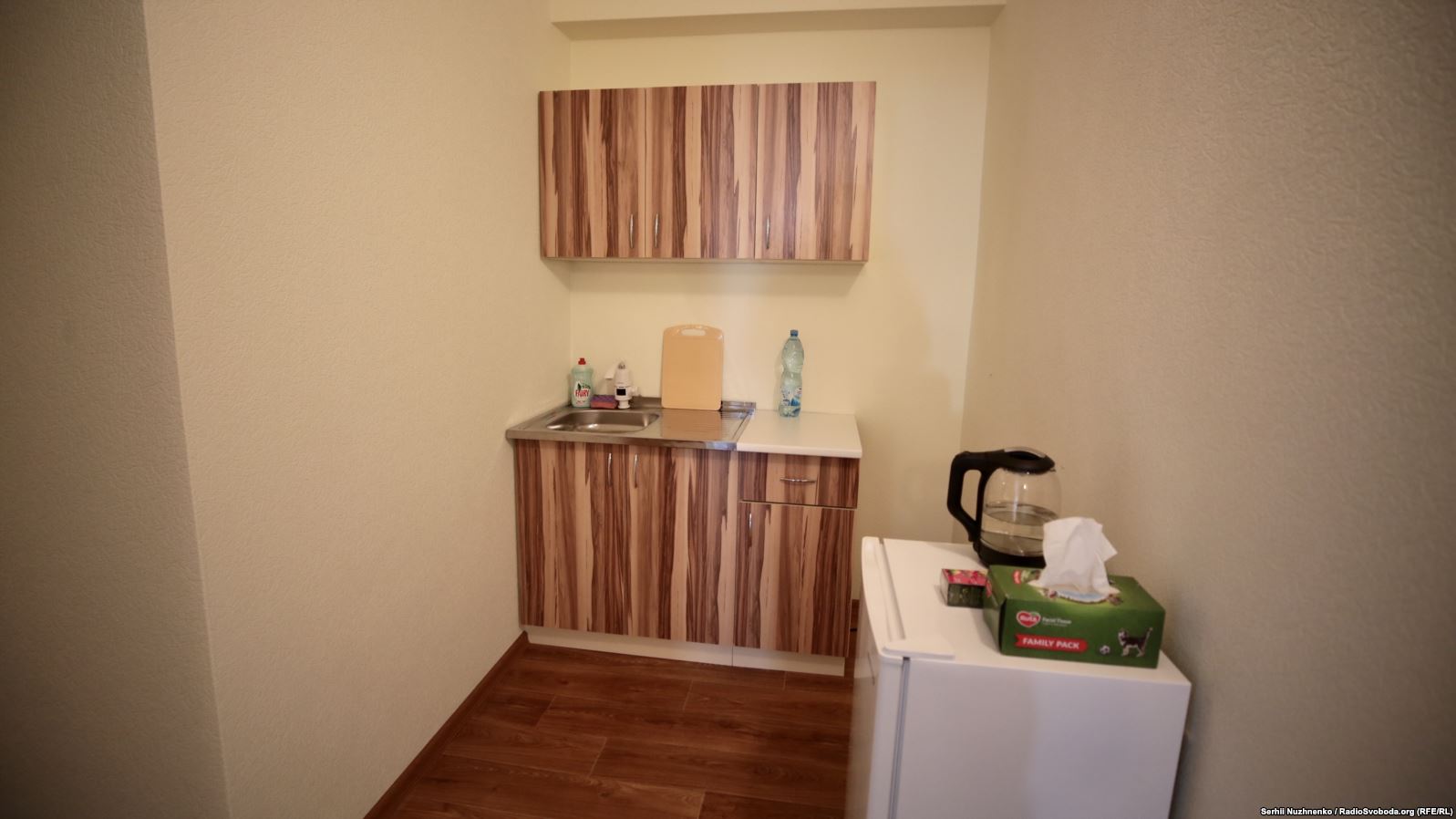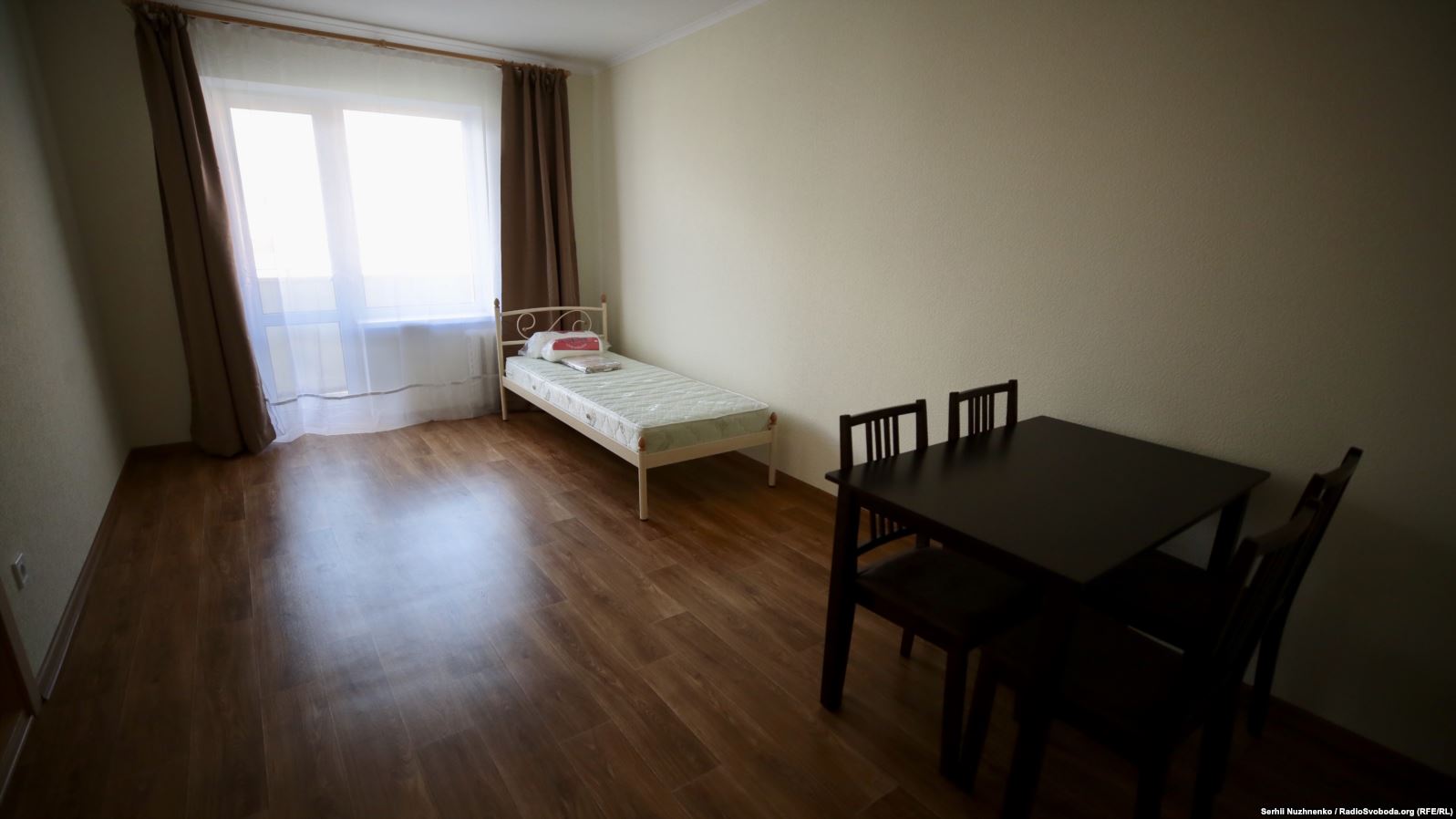In 2015, Oleksandr Kostenko, a Euromaidan activist from Simferopol, was sentenced to four years and two months after a court in Russian-occupied Crimea convicted him of allegedly attacking Berkut security troops in February 2014 during protests in the Ukrainian capital of Kyiv against pro-Russian President Viktor Yanukovych.
Kostenko was also found guilty of illegally obtaining, keeping, and carrying parts of a firearm. More details here.
After almost four years in prison, Oleksandr was released on August 3, 2018. Visibly exhausted and somewhat stunned, he spoke only a few words when questioned by the press. Oleksandr recently talked to journalist Kseniya Kirillova about his arrest, imprisonment, torture, the penal colony, and the FSB.
Former political prisoner and Crimean Euromaidan activist Oleksandr Kostenko continues to experience severe health problems after injuries sustained during torture and beatings by Russian FSB officers. It all started on February 5, 2015, when two FSB officers kidnapped Oleksandr near his home. He immediately recognized one of the kidnappers – a former SBU officer, Major Andriy Tyshenyn. The two officers threw the young man into a minibus and started beating him brutally.
“Tyshenyn put a bag over my head and tied it very tightly, so I almost choked. I was thrown violently on the floor of the minibus. At that moment, I didn’t understand what was happening as I couldn’t think clearly. I just wanted to breathe, but because of the bag on my head, it was very difficult, so I had to make a hole in it with my teeth in order to get some air. My hands were bound tightly with zip ties, so I couldn’t protect my head as they continued kicking me indiscriminately. Suddenly, my nose made a popping sound, and I knew it was broken.”
Kostenko says that the Russian officers wanted him to confess to attacking Berkut security officers during the Maidan protests and preparing sabotage acts in Crimea. The two FSB officers then drove Kostenko into a dense forest where they threatened to shoot him.
“They put a gun to my head and said that if I didn’t behave, I’d just disappear, because no one knew where I was. I heard a shot to my right; then they put the gun to my head again and asked me if I’d understood. When I nodded in agreement, they again put the gun to my head and pulled the trigger. I heard a click, but the gun didn’t fire…” recalls Oleksandr.
Oleksandr Kostenko is convinced that the Russian security forces wanted to “punish” him for serving in the Ukrainian police force before Euromaidan. However, at the very beginning of the Kyiv protests in 2013, Senior Lieutenant Oleksandr Kostenko resigned from his position in the police force and joined the Maidan protesters.
“I personally knew many former SBU employees who tortured me, as well as former employees of the Crimean police. I personally recruited that young girl who wanted to incriminate me. I must admit that the Russians didn’t beat me as violently as those Crimean traitors who joined the ranks of the Russian administration. They committed terrible crimes, and viciously attacked and beat me, toadying to their Russian masters,” recalls the activist.
Oleksandr was then taken from the forest to a private house, where they continued torturing him even more brutally. In addition to undergoing beatings, he was periodically shocked by electricity “for his participation in the Maidan and for the Donbas.” That’s when his jailers broke his arm.
“A former SBU officer, Artur Shambazov, kneeled on my back, took off the zip ties, grabbed my hair and my left wrist… and pulled my arm sharply. I felt a very strong, sharp pain in my elbow. I couldn’t move; I felt an unbearable pain shoot up my left arm. I was in shock. Shambazov asked me if I was ready to speak. I could neither speak nor move… the pain shot through my whole body. This angered Shambazov even more. Then, he stepped on my elbow. I could no longer bear the pain and started screaming, so they began beating me again.”

Oleksandr was then taken to the Crimean Bureau of Investigation and forced to sign several confessions: first, that he had allegedly thrown stones at the Berkut officers on the Maidan and inflicted bodily injuries on one of them, and second, that he had fired a rubber bullet handgun at them with clear intention to kill. Oleksandr refused to confess to attempting to kill the Berkut officers on the Maidan, but broke down and confessed to allegedly causing bodily harm to a Berkut employee, intimidated even more so when the investigator began threatening his family and relatives.
“The designated lawyer and the investigator took advantage of my weak physical and psychological condition. I knew that I was caught in a hopeless situation, so I was forced to sign the document without reading it. Initially, I was charged under Article 115, par. 1 of the Criminal Code of the Russian Federation, which provided for six months of detention. However, the article was classified in a more serious category. In any case, I had to sign a confession, because the lawyer told me in no uncertain terms: “You understand that if I leave now, they will simply kill you.” I knew she was right as I hadn’t been officially charged and detained by the FSB or the Investigation Committee. I realized that I could simply disappear, disappear without a trace, as dozens of others had disappeared in Crimea, and who had yet to be found. Moreover, I knew my family would suffer.”
Oleksandr Kostenko continues:
“As soon as I was transferred to the temporary holding facility, Chechen special forces officers visited the cell several times and repeatedly beat all the imprisoned Ukrainians. On February 9, I was transferred from the temporary holding facility to the detention centre, where I was immediately thrown into a “sweatbox”. I stayed there till April. After that, I was transferred to the “Donetsk cell” that was filled with criminals who openly supported the Russian occupation; some of them were members of the so-called “Donbas Orthodox militia”. They would gang up and beat me whenever there was another escalation on the front lines, or conflicts along the deployment positions, or intensification of artillery strikes by the Ukrainian army. My arm was broken, and I couldn’t defend myself. They called me the “каратель” (killer).”

As soon as Oleksandr disappeared, his family began knocking on doors to find out what had happened.
“My father wrote an appeal to the FSB, demanding to know the reasons for my abduction. However, they denied any involvement in my disappearance. Then, he wrote to the police. In response, the police came to my home to get a DNA sample in case my body was found somewhere. But, they knew perfectly well that I’d been detained by the FSB, since the entire process, starting from my abduction to the pronouncement of the sentence, was handled by the Crimean Prosecutor’s Office, namely, Natalya Poklonskaya. Subsequently, Vladimir Putin granted Poklonskaya the rank of 3rd Class State Counsellor of Justice for her services, which corresponds with the military rank of Major General.
The police pretended that they knew nothing about my arrest. In order to get my DNA, they cracked open my safe where I kept my officially registered weapons, and placed parts of a Makarov pistol inside to incriminate me. Of course, they didn’t have a search warrant.”
Kostenko’s relatives were also threatened and put under surveillance. During the trial, his brother was sentenced for allegedly “insulting the court”, and forced to pay a 60,000-ruble fine (approx. $905 US-Ed).
As to the charges brought against him, Oleksandr Kostenko swears that he did not throw stones at any Berkut officers, and did not commit any violent acts on the Maidan.
“The Investigation Committee claims I threw stones that hit a Berkut officer on the arm… but, the officer was holding a shield with that same arm… So, how could the stone hit the inner part of his arm, somewhere near the armpit?” Oleksandr points out.
As mentioned above, Natalya Poklonskaya was acting Prosecutor of Crimea in the case against Kostenko.
“It was important for her to condemn me by May 9 (Victory Day-Ed); in her eyes it was symbolic. Here’s what she said about me: “We aren’t going to judge this man, but the fascist ideology incarnated by this individual.” They managed to pronounce the verdict only on May 15, which made Poklonskaya even angrier. I was told: “You were lucky that your case was the first of its kind!”
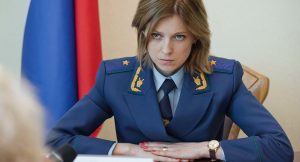
Indeed, Kostenko’s trial enabled the Russian security forces to gain experience and know-how so that the following trials of Euromaidan activists were disposed of very quickly, namely the trial of Andriy Kolomiyets, who was sentenced to a penal colony for ten years.
In May 2015, the Moscow-controlled court sentenced Oleksandr Kostenko to four years and two months in prison for allegedly causing injury to a Berkut officer during the Euromaidan protests in Kyiv. After reviewing the appeal, the detention period was reduced to three years and six months.
“On October 23, I arrived at Federal State Correctional Facility-5 in Kirovo-Chepetsk. I couldn’t move my arm, and yet I had to work as hard as the other inmates.”
Oleksandr recalls how the prisoners celebrated Victory Day. They improvised military parades with Soviet banners and with the participation of “veterans” wearing NKVD caps, as well as marches honouring the “Immortal Regiment”. (a newly-founded public civil-patriotic movement in Russia to preserve the personal memories of people who died in the Great Patriotic War. Every year on Victory Day, participants march along the streets carrying photos of their relatives who perished in WW2-Ed).
“Flowers were regularly placed at the foot of the monument honouring the founder of the penal colony, and fellow inmates, such as former police officers or members of Russian special services continued to quote Russian propaganda. These people really live in some kind of illusory reality. The only way they were able to get parole was to agree to serve in the Donbas. So, many of them enlisted and went to fight for Russia… to earn “forgiveness.”
After almost four years in prison, Oleksandr returned home on August 3, 2018 and was greeted as a hero. He was handed the keys to an apartment and promised medical assistance. However, he returned the keys after a few days.
“I don’t I deserve such a gift just because I was in prison. So many men and women have fought for Ukraine; many have returned home wounded or disabled, and they haven’t been provided with housing. But, I won’t refuse medical assistance. I need to restore complete arm movement. If I don’t recover in six months, the doctors will replace my elbow with an artificial joint. I have this weird sensation that this elbow is not part of my body.”
Oleksandr Kostenko and his brother currently live in Kyiv. They hope to get other family members out of Crimea. Oleksandr’s main objective is to find a job, but he knows it won’t be easy due to his broken arm.





